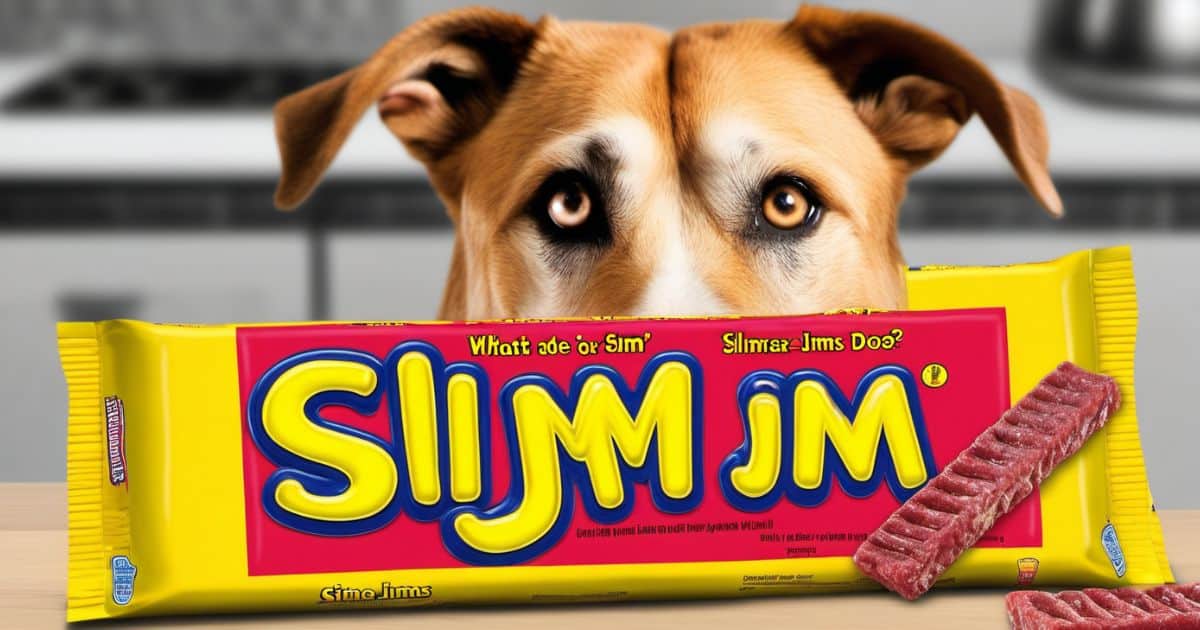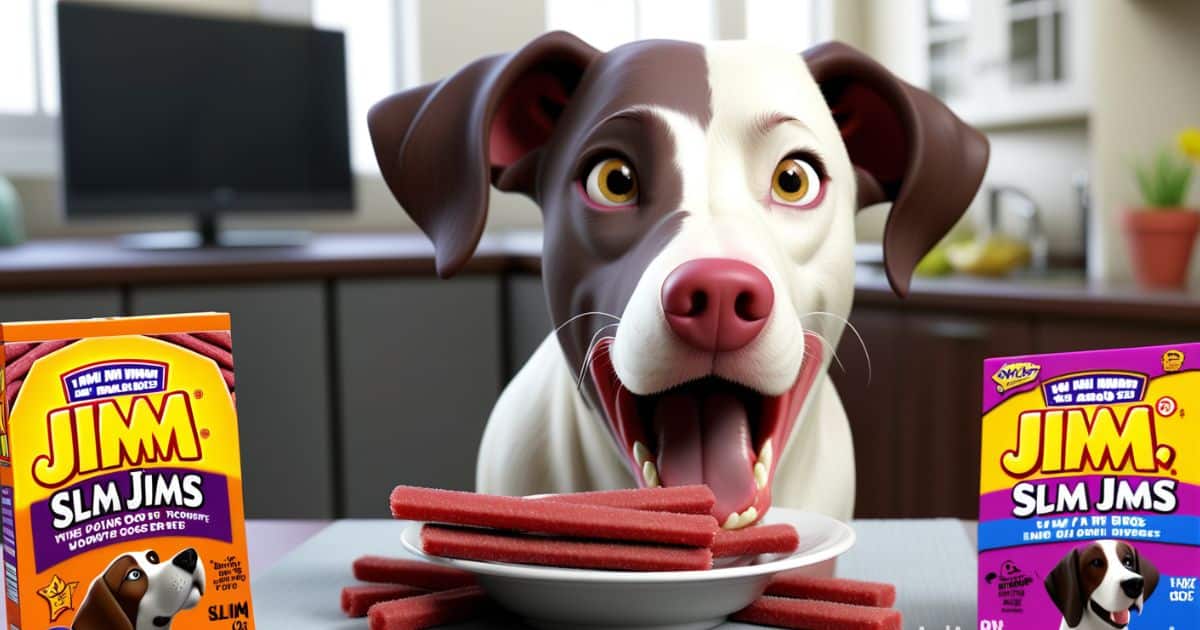Slim Jims, a popular snack, are not recommended for dogs due to their high sodium and fat content, which can cause health issues like pancreatitis. These snacks also contain seasonings like garlic and onion powder, harmful to dogs. Feeding dogs Slim Jims could lead to digestive upset and more severe health concerns.
Are you tempted to share your Slim Jim with your furry friend? Think again! Find out why this favorite snack could be a risky treat for dogs. Learn about the hidden dangers in Slim Jims that could harm your dog’s health. Keep your pet safe and informed!
What Are Slim Jims Precisely?
Slim Jims, popularly known as a convenient and flavorful snack for humans, are cylindrical sticks of processed meat, typically made from a blend of beef, pork, and chicken. These snacks are seasoned with a mix of spices, giving them a distinctive smoky flavor. While they are enjoyed by many, it’s crucial to understand their composition before considering sharing them with our furry friends.
In essence, Slim Jims consist of processed meats, often high in salt and containing various additives and preservatives. The processing involves curing, smoking, and drying the meat, resulting in a product with an extended shelf life. While humans may find them palatable, the suitability of Slim Jims for canine consumption raises important questions.
What Are The Potential Risks Of Giving Slim Jims To Dogs?

Before indulging your dog in what seems like a tasty treat, it’s essential to be aware of the potential risks associated with feeding Slim Jims. These risks primarily stem from the snack’s composition and processing methods.
High Salt Content
One significant concern lies in the high salt content of Slim Jims. Dogs, unlike humans, are more sensitive to excessive salt intake, and it can lead to various health issues. Too much salt can contribute to dehydration, increased thirst, and elevated blood pressure in dogs, potentially leading to more severe conditions.
Processed Meat
The nature of processed meat in Slim Jims is another red flag. Processed meats often contain additives and preservatives that may not align with a dog’s digestive system. Additionally, certain processing methods could result in the formation of potentially harmful compounds.
Additives
Slim Jims often contain additives such as flavor enhancers, colorings, and other chemicals to enhance their taste and appearance. Dogs may react differently to these additives, and some can be outright harmful. It’s crucial to scrutinize the ingredient list for any additives that might pose a risk to your dog’s health.
Preservatives
Preservatives play a vital role in extending the shelf life of Slim Jims, but they might not be as friendly to your dog’s digestive system. Some dogs may be sensitive or allergic to specific preservatives, leading to adverse reactions.
Is There Any Historical Background Of Using Slim Jims In Dogs’ Diets?

While Slim Jims have been a popular snack for humans, their historical background in canine diets is limited. Traditionally, dogs have been fed diets consisting of unprocessed, natural foods tailored to their nutritional needs. The introduction of highly processed snacks like Slim Jims is a relatively recent phenomenon, and historical evidence of their inclusion in dog diets is scarce.
Can I Give Slim Jims As A Training Treat To My Dog?
When it comes to training treats, the choice is critical for both motivation and health. Let’s break down the considerations if you’re contemplating using Slim Jims as a reward during training sessions.
Size and Texture
The size and texture of Slim Jims might make them appealing for training purposes, as they can be easily broken into smaller portions. However, ensure that the size of the treat aligns with your dog’s size to avoid overfeeding.
Nutritional Value
Examining the nutritional value is essential. While Slim Jims may offer a protein boost, their overall nutritional profile may not be the healthiest choice for your dog. It’s crucial to balance treats with your dog’s regular diet to prevent nutritional imbalances.
Ingredients
Analyzing the ingredients is paramount. If Slim Jims contain excessive salt, additives, or preservatives, it’s advisable to seek alternative, healthier training treats to ensure your dog’s well-being.
Special Dietary Requirements
Consider any special dietary requirements your dog may have. If your dog has allergies or sensitivities, it’s best to opt for training treats specifically formulated to meet their needs.
How Can I Prepare Slim Jims At Home?

For those keen on preparing dog-friendly Slim Jims at home, let’s explore a DIY approach that prioritizes your furry friend’s health. Dogs Eat Slim Jims in moderation as an occasional treat, but too much can cause health issues. Homemade recipes allow control over ingredients.
Ingredients
Gathering the right ingredients is the first step. Opt for lean meats, avoiding excessive use of salt, additives, or preservatives. Consider consulting your veterinarian for guidance on suitable ingredients for your dog.
Instructions
The preparation process involves careful cooking, drying, and seasoning. Ensure that the final product is free from any harmful substances and tailored to your dog’s taste preferences. Homemade Slim Jims can provide a safer alternative, allowing you to control the ingredients.
Is It Okay To Give My Dog Beef Jerky?

While exploring canine diet options, beef jerky often comes into consideration. Let’s dissect whether beef jerky is a safe choice for your dog.
- Protein Source:
Beef jerky is a good source of protein for dogs, which is essential for muscle development and overall health.
- Nutritional Value:
It contains important nutrients such as iron, zinc, and B-vitamins, contributing to a balanced diet for dogs.
- Moderation is Key:
While beef jerky can be a healthy treat, it should be given in moderation. Excessive consumption can lead to digestive issues and weight gain.
- Sodium Content:
Store-bought beef jerky often contains high levels of sodium, which can be harmful to dogs. It’s important to choose low-sodium options or make homemade jerky without added salt.
- Avoid Additives:
Some commercial jerky products may contain additives, preservatives, or flavorings that can be harmful to dogs. Always check the ingredients list and opt for natural, additive-free options.
- Homemade Options:
Consider making homemade beef jerky for your dog, ensuring you have control over the ingredients and can tailor it to your pet’s specific dietary needs.
- Risk of Contamination:
Commercially produced jerky may sometimes be contaminated with harmful substances. Ensure the product is sourced from reputable brands and follow proper storage guidelines.
- Allergies:
Monitor your dog for any signs of allergies or sensitivities to beef. If your dog has a history of allergies, consult with a veterinarian before introducing beef jerky into their diet.
- Cut into Small Pieces:
To prevent choking, cut the beef jerky into small, manageable pieces appropriate for your dog’s size.
- Supervision:
Always supervise your dog when giving them beef jerky, especially if it’s a new treat. Watch for any adverse reactions or difficulties in chewing.
- Consult with a Veterinarian:
Before incorporating beef jerky into your dog’s regular diet, consult with a veterinarian. They can provide personalized advice based on your dog’s breed, age, and health condition.
What Happens If A Dog Eats A Slim Jim?
Despite our best efforts, dogs may occasionally find and consume Slim Jims. Understanding the potential consequences is crucial for prompt action.
Upset Stomach
Consuming Slim Jims may lead to an upset stomach in dogs. Common symptoms include vomiting, diarrhea, or general gastrointestinal discomfort. If these symptoms persist, consult your veterinarian.
Pancreatitis
Pancreatitis, inflammation of the pancreas, is a severe concern. The high fat content in Slim Jims can potentially trigger pancreatitis in dogs. Immediate veterinary attention is necessary if you suspect this condition.
Salt Poisoning
Excessive salt intake can result in salt poisoning, a serious condition affecting dogs. Symptoms include vomiting, diarrhea, lethargy, and in severe cases, seizures. Seek immediate veterinary care if you suspect salt poisoning.
Can Dogs Eat Plain Beef?

Considering alternatives to processed snacks, let’s explore the suitability of plain beef for dogs.
Ensuring your canine companion enjoys tasty and safe snacks is essential for their well-being. Below are some dog-friendly snacks along with nutritional insights:
Healthy Dog-Friendly Snacks
| Snack | Benefits |
| Carrot Sticks | Rich in vitamins, aids dental health |
| Blueberries | Packed with antioxidants |
| Peanut Butter (in moderation) | Protein source, healthy fats |
| Apple Slices | High in fiber, vitamins, and minerals |
| Plain Popcorn (no salt) | Low-calorie treat |
| Pumpkin Cubes | Supports digestion, vitamins A and C |
Snacks to Avoid
| Snack | Risks |
| Chocolate | Toxic to dogs, can cause severe reactions |
| Grapes/Raisins | Linked to kidney failure |
| Onions/Garlic | Can cause gastrointestinal issues |
| Xylitol (found in some gums) | Highly toxic, may cause rapid insulin release |
| Fatty or Spicy Foods | Risk of pancreatitis |
When choosing snacks, consider your dog’s size, health status, and any dietary restrictions. Always introduce new treats gradually and monitor for any adverse reactions. Consult your veterinarian to tailor snacks to your dog’s specific needs. Remember, a balanced diet contributes to a happy and healthy canine companion.
FAQ’s
Are Slim Jims okay for dogs?
It’s not recommended. Slim Jims often contain high levels of sodium and artificial additives, which can be harmful to dogs.
Can dogs eat beef sticks?
In moderation and without added spices or high sodium content, plain beef sticks can be safer alternative for dogs. Always check ingredients and consult with a vet.
What happens if a dog eats Slim Jim and wrapper?
Ingesting the wrapper can pose a choking hazard or lead to digestive issues. Contact a vet immediately if your dog consumes Slim Jim and its wrapper.
What animals are Slim Jims made of?
Slim Jims are typically made from a blend of beef, pork, and chicken, along with various spices and flavorings. Always check the specific product’s ingredients for accuracy.
Final Thoughts
In conclusion, while Slim Jims are a tempting snack for humans, their suitability for dogs is highly questionable. With high salt content, processed meats, and potential additives and preservatives, these snacks pose significant health risks to our canine companions. The risks range from digestive upset to more severe conditions like pancreatitis and salt poisoning. It’s crucial for pet owners to prioritize their dog’s health by choosing appropriate, dog-safe treats. If in doubt, consult a veterinarian for advice on suitable snacks. Remember, what’s a tasty treat for us might not be safe for our furry friends. Keeping our pets healthy and happy should always be a top priority. Learn more Cats Eat Information “Can Cats Eat Slim Jims?“









